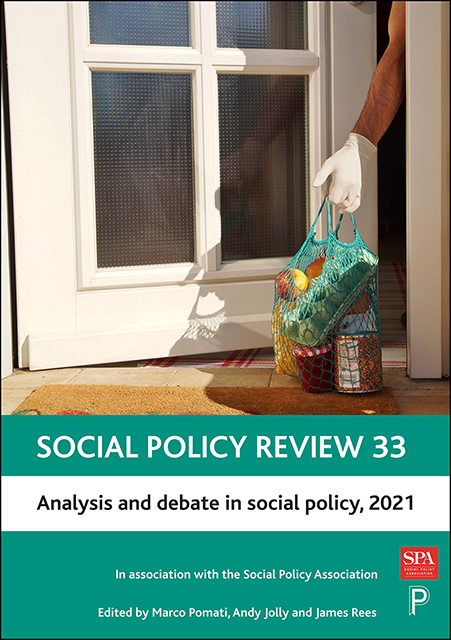5 - Social policies put to the test by the pandemic: food banks as an indicator of the inadequacies of contemporary labour markets and social policies
Published online by Cambridge University Press: 14 April 2023
Summary
Introduction
The COVID-19 pandemic and the ensuing lockdown have shed light on structural and situational – that is, tied to the current economic crisis – insufficiencies of contemporary labour markets and social policies and their incapacity to reduce inequalities and prevent precariousness. In many countries, food banks and similar food distributions emerged very early in the crisis to support people whose living conditions had considerably worsened and were not, or not adequately, supported by existing labour markets and social policies. This took place particularly acutely in Geneva, Switzerland, where thousands of people had to queue to get food bags during the lockdown, bringing to light the largely unexpected existence of an important pocket of vulnerability and poverty in one of the richest cities in the world. This situation surprised policymakers, field actors and academics alike, and emphasised the need to collect more knowledge about this – until then widely invisible – population.
More broadly, understanding this situation requires questioning the relevance of the existing mechanisms of social protection, which rely on two main pillars in order to ensure people's welfare as far as possible: first, the labour market and the capacity to get an income from one's labour and make a living of one's own; and second, the welfare state and its ability to complement insufficient income or to compensate for absent income. Taken together, these two pillars are thought to be able to guarantee social inclusion and a decent standard of living for all members of society. The ongoing pandemic reveals the structural and situational inadequacies of both the labour market and the welfare state, and points to the conditions needed to overcome them. On the one hand, the labour market organises the matching of labour supply and demand; this is embedded in institutional rules such as labour law, collective labour agreements and labour contracts that aim at guaranteeing a minimum threshold of rights and working conditions when at work. The pandemic crisis has shed a harsh light on the number of people who do not enjoy such protection, as they are undeclared workers – that is, their employment is not declared to public authorities and they therefore do not pay contributions to social insurance or benefit from legal protection. For them, the labour contract is nothing but a private disembedded arrangement, the duration and terms of which depend largely upon the employer's goodwill. In such cases, social protection proves to be virtually non-existent.
- Type
- Chapter
- Information
- Social Policy Review 33Analysis and Debate in Social Policy, 2021, pp. 95 - 114Publisher: Bristol University PressPrint publication year: 2021

